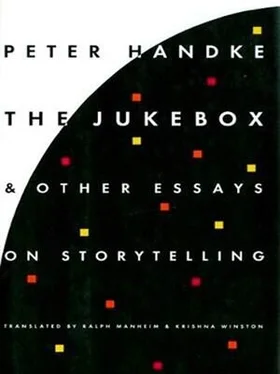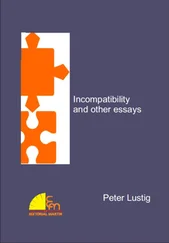Having reached this point in his ruminations, ready simply to drop everything toward which his thoughts had pointed in recent months (“Be silent about what is dear to you, and write about what angers and provokes you!”), resolved to enjoy his time for a while, doing nothing and continuing to be a sightseer on the Continent, he suddenly experienced a remarkable pleasure in the possible meaninglessness of his project — freedom! — and at the same time the energy to get to work on this little nothing, though if possible somewhere other than in this world-forsaken town of Soria.
For the night he found a room in a hotel named after a medieval Spanish king. Almost every strange place he had encountered on his travels that had seemed at first sight insignificant and isolated had revealed itself to him, when he set out to walk it, as unexpectedly spread out, as part of the world; “What a big city!” he had marveled again and again, and even “What a big town!” But Soria, to whose narrow streets he entrusted himself on that rainy evening, did not expand, even when he groped his way in the dark out of town and uphill to where the ruined citadel stood; no glittering avenida; the town, nothing but a few faded boxlike walls at the bend in the narrow streets, revealed itself to him, as he then wandered from bar to bar, all of them almost empty already, enlivened now by the repetitious siren songs of the slot machines, as an all-too-familiar Central European town, only with more blackness within the city limits — the winter-deserted oval of the bullfighting ring — and surrounded by blackness. He had already concluded that nothing remained to be discovered and generated there. But for now it was nice to be walking without luggage. The front row of a bookstore’s display consisted exclusively of books by Harold Robbins — and why not? And in a small square toward midnight the damp, jagged leaves of the plane trees glittered and beckoned. And the ticket booths of the two movie houses, the Rex and the Avenida, had their windows, almost invisible, as only in Spain, next to the wide entrances, looking directly out on the street, and inside, half cut off by the frames, showed the face of what seemed the identical old woman. And the wine did not have a small-town taste. And the pattern on the sidewalk tiles in the town of Soria consisted of interlocking squares, rounded at the edges, while the corresponding pattern in the city of Burgos had been battlements? And the Spanish word for equanimity was ecuanimidad . He made up a litany with this word, alternating it with that Greek word for having time.
In his dream, a hundred people appeared. A general, at the same time an epigone of Shakespeare, shot himself out of sorrow at the state of the world. A hare fled across a field, a duck swam downriver. A child disappeared without a trace, before everyone’s eyes. The villagers, according to hearsay, were dying from one hour to the next, and the priest was completely taken up with burials. (Strange, the role of hearsay in dreams — it was neither said nor heard, but simply moved silently through the air.) Grandfather’s nosebleeds smelled of damp dog hair. Another child had the first name “Soul.” Someone proclaimed, loudly this time, the importance of hearing in these times.
The next day — it remained rainy, and according to the newspaper, Soria was again the coldest province in Spain — he set out for a farewell stroll through town. Without having intended it, he suddenly found himself standing before the façade of Santo Domingo, its age immediately revealed by its dimensions and the light sandstone, worn smooth in many places by the wind. What a jolt he always received from Romanesque structures; he at once felt their proportions in himself, in his shoulders, his hips, the soles of his feet, like his actual, hidden body. Yes, corporeality: that was the sensation with which he now approached, as slowly as possible, this church shaped like a grain box, in a wide arc. In the very first moment, taking in the delicacy of the surface with its rounded arches and figures, he had thought of a phrase used by Borges, “the brotherliness of the beautiful,” yet at the same time he was overcome with reluctance to absorb the whole thing at once, and he decided to postpone until evening departing for who knows where, and before leaving to come back again, when the daylight on the stone carvings would have changed. For the time being, he merely tried to identify variations in the groups of figures, already dear and familiar to him. And variations there were (without his having to look for them very long), as always in Romanesque sculpture, and they appeared to him again as the secret emblems of the place. Here in Soria they were visible as far as the eye could see: the solicitous way God the Father bent at the hips as he helped the newly created Adam to his feet; the blanket, almost smooth in one representation, in other portrayals consistently lumpy, under which the Three Kings slumbered; the acanthus leaf, shell-shaped, the size of a tree, that rose behind the empty tomb after the Resurrection; in a semicircle above the portal (in almond form the outline of the smiling father with the likewise smiling son on his knees, balancing the thick stone book), the allegorical animals representing the Evangelists, crouching not on the ground but on the laps of angels, and not just the apparently newborn lion cub and the bull calf, but even the mighty eagle …
As he hurried away, he looked back over his shoulder and saw the delicately carved housing — all the more clearly its emptiness — standing, in the expression used by the cabaret artist Karl Valentin, “out in the open”: from this vantage point, the structure, as broad as it was squat (all the apartment buildings around it were taller), with the sky above, in spite of the trucks roaring by, offered a positively ideal image: the building, so utterly different from the rigid façades surrounding it, appeared playful, active precisely in its tranquillity — it was playing. And the thought came to him that back then, eight hundred years ago, at least in Europe, for the duration of one stylistic period, human history, individual as well as collective, had been wonderfully clear. Or was that only the illusion conveyed by this absolutely consistent form (not a mere style)? But how had such a form, at once majestic and childlike, and so readily comprehended, emerged?
Soria, as became apparent now by day, lay between two hills, one wooded and one bare, in a valley sloping down to the Duero. The river flowed past the last, scattered houses, on the other side a vast expanse of craggy land. A stone bridge spanned the river, bearing the road to Zaragoza. At the same time as the arches, the newly arrived observer noted their number. A gentle wind was blowing, and the clouds were in motion. Down there, among the leafless poplars along the bank, an excited dog was chasing the leaves that swirled up now here, now there. The reeds were flattened into the dark water; only a few cattails stuck out. The stranger — strange? — given access here by the locale — struck out in the opposite direction toward the well-known promenade of the poet Machado and went upriver, following a dirt path crisscrossed by the roots of the pines. Silence; a current of air at his temples (he had once imagined that one of the manufacturers responsible for such things might offer for these parts of the face a special moisturizer, so that even the slightest puff of air would be felt by the skin, as the epitome of — what should one call it? — the here-and-now).
Back from the wide-open spaces, he had a cup of coffee in a bar down by the river called Río, a young gypsy behind the counter. A few retired men — the Spanish word, according to the dictionary, was jubilados —were without exception watching the morning TV program with utter concentration and enthusiasm. From the incessant traffic passing on the highway, glasses and cups shook in the hands of all those present. In one corner stood a barely knee-high cylindrical cast-iron stove, tapered toward the top, with vertical fluting and in the middle an ornament like a scallop shell; in the grate down below the fire glowed red-hot. From the tiled floor rose the scent of the fresh sawdust that had been strewn that morning.
Читать дальше












